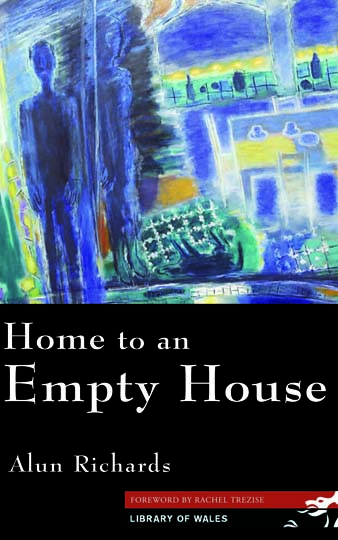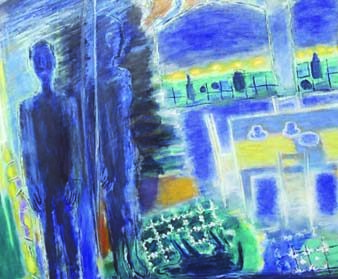Jon Gower reviews the hilarious yet honest Home to an Empty House by Pontypridd novelist and screenwriter Alun Richards.
The novelist and screenwriter Alun Richards from Pontypridd was a consummate producer of fine sentences, which in turn powered and coloured half a dozen novels, two cracking collections of short stories, along with stage plays, screenplays and TV series, including The Onedin Line, which took many viewers grippingly out to sea. In real life Richards wove his fine sentences into expansive, heart conversations, fuelled by great bonhomie and perhaps an early afternoon cocktail, stirred not shaken, the Mumbles way.
Home to An Empty House, first published in 1973, is a little belter of a novel, with many, many of those trademark Alun Richards’ lines, which are often side-splittingly funny and oftentimes deliciously scabrous. I can’t remember laughing so much in aeons.
Welsh working class novels often feature the emphysemic and silicotic breathing of retired coal miners, wheezing like cages of budgerigars. But Richards goes the whole hog, describing the coughing of one breathless unfortunate, Dai Gash as being ‘like a self-created Coal Board philharmonic, an orchestrated wheeze that could vary from a low staccato note to a high piping falsetto.’ The tribulations and trials of one the families in the novel is brought vibrantly to life when we are told that they were ‘No strangers to disaster, they fed on it like benign sharks with shielded cutting teeth. Bad luck, ill health, a tightening of credit, they had noses like acrobats for the high tensions of overdraft living.’

by Alun Richards
At its heart Home to An Empty House is a tale of a doomed marital relationship, and expands as a mordant tragicomedy, featuring the childless Walter and Connie, whose sex life is improbably sparky considering the vats of booze they put away. But things have come to a pretty underpass – as Flanders and Swann once put it – and in a brisk but pivotal scene we map out the emptiness of life for Walter and Connie:
Then she said a terrible thing: ‘We’re just two people for whom things haven’t gone very well.’
‘And?’
‘That’s all.’
I knew what she meant and it was suddenly the low point of low. Two people for whom things hadn’t gone very well.’
So their sex life turns out to be really an act, or acts of desperation. Walter’s sexual athleticism is almost medal-worthy when we find out that not only has he got TB but also an offshoot condition, a disease hardly ever encountered by opthalmologists, which has released “floaters” in his eyes.
The illness takes an exacting toll, making poor Walter look like a ‘cross between the leader of the peasants’ revolt and a Maltese brothel keeper with a developing hump fattening like a marrow where the shoulder dropped.’ Ill, and getting more ill, much of Walter’s time is spent in a sanatorium, where the new drugs haven’t quite replaced brutal surgery, and when operations to remove ribs were de rigeur and happened ‘under local anaesthetic and you could hear the ribs falling one by one into the bucket under the table.’
While Walter languishes in a sanatorium Connie embarks briskly on an affair with a schools inspector called Ifor, and this immorality, heedless of the sick husband is a moral fulcrum of the book, especially when viewed through the twitching net curtains of the woman who lives above Walt and Connie’s basement flat, the redoubtable and matriarchal Auntie Rachel.
It is the oldest story in the world, the older man and younger woman, the one seeking what he has lost, the other finding out what is in front of her…Soft, I call it, like all wishful thinking. They snatch at each other’s bodies in the dark and think it is important.
The book has one very obvious design fault, in that there is one character, Ifor’s wife Hilda who is really only there as a plot device, a deus ex machina, and thus the single chapter she merits to herself seems throwaway, especially when many of her thoughts and impulses are rendered in a sort of staccato shorthand, thus an afternoon is chronicled thus…
In the afternoons, I find it difficult to concentrate.
I feel guilty about my son.
I cannot think what people did before vodka.
I know far more than people realise. I still have a good brain.
Perhaps Ifor is a pervert.
But that’s a minor grouse, as the book is a rambunctious, energetic and energizing affair, full of tumbling, acrobatic language and sharp-eyed humour. Home to an Empty House is a tale of lost love, of wrong love and of a modern woman, Connie, asserting her own wishes, and expressing her own needs just as phthisis slowly claims her husband, a man shipwrecked on the shore of marriage, marooned there in its cloying emptiness.
Jon Gower is an author and regular contributor to Wales Arts Review.











